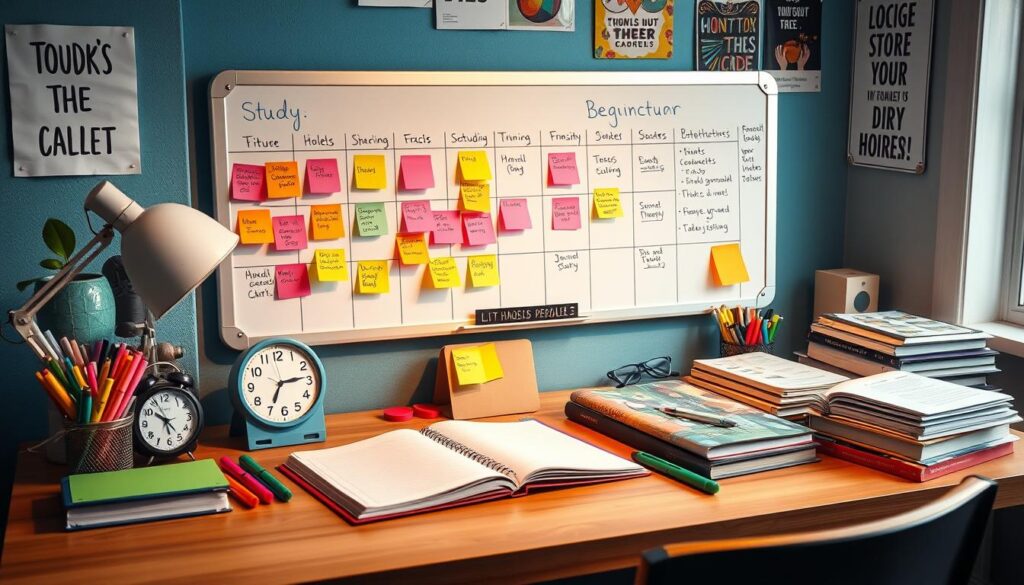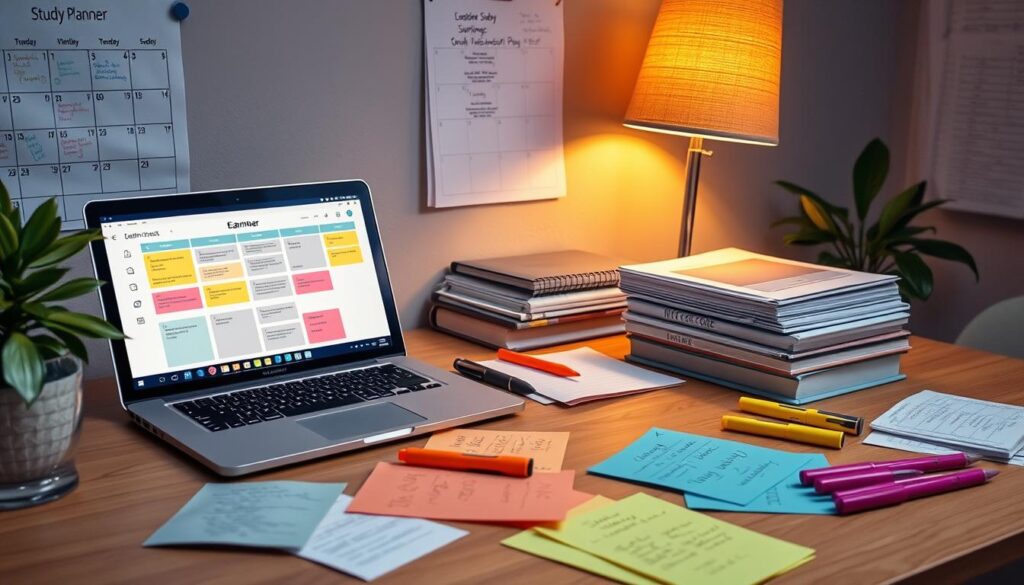Getting ready for exams is key to doing well in school, especially for those in tough Intensive Exam Preparation E courses or big exams. Whether it’s a tough language test like the TOEFL, a hard technical subject, or a big final exam, having a good study plan is vital. A well-made plan helps you use your study time wisely, remember things better, and feel more confident when you take the exam.
A study plan is a detailed schedule that shows when and what you’ll study. It’s a must-have for managing college life and keeping track of your progress. A good plan lets you see how you’re using your time and makes sure you have enough time to do homework, study for tests, and review what you’ve learned. This is especially true for online students who need to stay focused and disciplined to finish their studies.
Key Takeaways
- Creating a good study plan means understanding how you learn best and how you study.
- Looking at your current schedule and commitments is key to planning enough study time for each class.
- Setting achievable goals and sticking to regular study times and places is crucial for a solid study schedule.
- Using methods like studying right after class, making the most of spare time, and taking breaks can boost your exam prep.
- Regularly reviewing, reciting, and practicing what you’ve learned, and keeping detailed notes, can make your study sessions more effective.
Understanding the Importance of a Study Plan
A study plan is key for college students aiming for top grades. It’s a detailed schedule for studying, setting goals, and learning strategies. This helps manage college work well.
With a good study plan, students improve their time management, self-discipline, and learning outcomes.
What is a Study Plan?
A study plan is a way to organize your school work. It’s a schedule for homework, assignments, test prep, and reviewing material. It ensures enough time is set aside to study and keep information.
Why Do I Need a Study Plan?
Online students especially need a study plan. It helps them stay disciplined and on track. Without a teacher’s reminders, it’s easy to fall behind.
Studies show that 83% of students with a study plan do better in school.
It also helps students see how they use their time. For example, 54% find studying for 30 minutes each night better than long study sessions.
In summary, a study plan is a vital tool for college students. It boosts learning outcomes, self-discipline, and leads to success.
Tips for Creating an Effective Study Plan

Creating a good study plan is key to doing well in school. First, students need to figure out their learning styles and study habits. They should find out when they study best and how they remember things best.
Then, they should look at their current schedule and commitments to find time to study. This makes sure they have enough time for each class and assignment. They should use the syllabus and plan for test preparation.
Analyze Your Learning Style and Study Habits
- Determine your most productive study times and environments
- Identify effective study techniques that align with your learning preferences
- Experiment with various strategies to discover what works best for you
Evaluate Your Current Schedule and Commitments
- Review your weekly schedule to identify available time for studying
- Prioritize your classes and assignments based on deadlines and difficulty levels
- Allocate sufficient time for each subject, considering the course syllabus and test preparation requirements
Plan Adequate Study Time for Each Class
| Class | Study Time (per week) | Assignments | Exams |
|---|---|---|---|
| English Composition | 6 hours | 2 essays, 1 research paper | Midterm, Final |
| Introduction to Psychology | 4 hours | 3 quizzes, 1 group project | Midterm, Final |
| Calculus I | 8 hours | Weekly problem sets, 2 projects | 3 exams, Final |
By following these steps, students can make a detailed study plan. This plan meets their needs and school commitments.
Developing a Structured Study Schedule

Creating a good study plan is key to doing well in school. A big part of this is making a study schedule. This means setting goals for each class and picking regular times and places to study. By doing this, students can build good habits and stay focused.
Set Realistic Goals and Objectives
To make your study schedule work, set clear goals. Use the SMART framework to make these goals specific, measurable, attainable, relevant, and time-bound. This keeps you focused and motivated while studying.
Establish Consistent Study Times and Locations
Being consistent is important for studying well. Pick specific times and places for studying and try to stick to them. Studies show that studying during the day is more effective than at night.
Also, think about how you learn best when choosing where to study. Visual learners do well in places with diagrams and charts. Auditory learners prefer quiet spots for listening to lectures. Kinesthetic learners do best in flexible areas that allow for movement.
Sticking to a study schedule and making it fit your needs boosts productivity and time management. This helps you succeed in your studies.
| Learning Style | Optimal Study Locations |
|---|---|
| Visual Learners | Dedicated study spaces with visual aids |
| Auditory Learners | Quiet environments for listening to lectures or discussions |
| Kinesthetic Learners | Flexible spaces that allow for hands-on activities and breaks |
Intensive Exam Preparation Strategies

As you prepare for your exams, using smart study methods is crucial. Study what you learned in class right away. This helps move the information from your short–term to long-term memory, making it stick better.
Also, use any free time to look over your notes or do assignments. Even small breaks can help you stay ahead in your studies. This keeps you moving forward.
Set Time Limits and Take Breaks
It’s vital to set study time limits and take breaks. This stops you from getting too tired and keeps your focus sharp. Try the Pomodoro Technique, which is 25 minutes of study followed by a short break. It’s a great way to organize your study time.
| Exam Preparation Strategy | Potential Impact |
|---|---|
| Studying immediately after class | Transfers information from short–term to long-term memory |
| Utilizing spare time efficiently | Maintains momentum and keeps you on track with your studies |
| Setting time limits and taking breaks | Prevents burnout and enhances focus and productivity |
By using these strategies, you can greatly improve your exam success. Remember, being consistent and strategic is key to good exam prep.
Maximizing Your Study Sessions

To make the most of your study time, it’s key to use effective strategies. These go beyond just reading. By reviewing, reciting, and practicing what you learn, you can boost your retention and productivity.
Review, Recite, and Practice Regularly
Studies show that short study sessions with breaks work best. Set daily, weekly, and monthly goals to see how you’re doing. Practice answering exam questions a lot, as it’s a top strategy for success.
It’s also important to take breaks during your study time. This helps you perform at your best.
Organize and Maintain Comprehensive Notes
Organizing your notes in a Q&A format and testing yourself helps a lot. It improves your memorization and understanding. Keeping detailed, organized notes from lectures and assignments is great for studying and exams.
Using visual aids like mind maps and diagrams can also help. They make it easier to organize and connect important ideas. Studying with friends can also be beneficial. It gives you support, motivation, and a chance to discuss and learn together.
“Setting SMART goals for effective studying is shown to increase productivity and focus during study sessions according to 85% of students who applied this technique.”
By using these strategies, you can enhance your retention, productivity, and grades.
Time Management and Flexibility

Good time management and flexibility are key to a successful study plan. It’s important to have some unscheduled time for unexpected events or to adjust your schedule. If study time gets disrupted, find a way to make it up instead of skipping it.
Students should also plan their time wisely. Set aside certain evenings or weekends for studying and rotate fun activities. This way, you keep a balance and stay productive. Being flexible and managing your time well is crucial for success in exam prep.
Allow for Unscheduled Time and Adjustments
Make sure to include some unscheduled time in your study plan. This is for unexpected events or when you need to adjust your schedule. Being flexible helps you stay on track and avoid falling behind.
Trade Time Wisely, Don’t Steal It
Time management is all about being strategic. Set aside specific times for studying and switch up your fun activities. This time trade-off method is better than taking study time away. It helps you stay consistent and productive.
“Effective time management reduces stress levels and helps students prioritize tasks by allocating the necessary time for each activity.”
By being flexible and smart with your time, you can keep up with your exam prep. This will help you reach your academic goals.
Also Read : What Are The Benefits Of Using A Visual Revision Schedules?
Conclusion
Creating a good plan for intensive exam prep is key to success. It’s important to have a study plan and use strategies like studying right after class. Also, make the most of your study time with review and organization.
Managing your time well and being flexible is crucial. This way, you can improve your exam preparation and academic performance. You’ll feel more ready for tough exams.
Good time management and study planning are vital for success. By setting goals, optimizing study time, and staying flexible, you can create a plan that fits your learning style. This ensures you’re ready to do well on your exams.
The secret to acing exams is a balanced approach. It includes good study habits, smart time use, and a focus on learning for the long haul. By following these tips, you’ll not only pass your exams but also gain skills that last a lifetime.
FAQs
Q: What are the first steps to prepare for the TOEFL test?
A: To prepare for the TOEFL test, you should first assess your current English language level. Then, create a study plan that includes a variety of preparation courses, such as online lessons and classroom sessions. Be sure to book a tutor who has experience with TOEFL preparation to guide you through the process.
Q: How long should I spend preparing for the TOEFL test?
A: The time you need to prepare for the TOEFL test depends on your current level and goals. Typically, students spend four to six weeks in intensive preparation courses. However, you may want to adjust this based on your personal schedule and the time available before your examination date.
Q: Are there any specific materials I should use for TOEFL preparation?
A: Yes, there are many excellent resources available for TOEFL preparation. You can find preparation books, online practice tests, and lesson sheets that cover all sections of the test: reading, writing, listening, and speaking. It’s essential to select materials that match your learning style and level.
Q: Can I prepare for the TOEFL test online?
A: Absolutely! Many students choose to prepare for the TOEFL test online due to the flexibility it offers. Online courses often provide interactive lessons and resources, and you can work at your own pace. Just ensure that the course you select is reputable and offers comprehensive coverage of the exam content.
Q: How can I improve my speaking skills for the TOEFL test?
A: To improve your speaking skills, practice speaking in English as much as possible. You can join a study group, work with a tutor, or use language exchange platforms. Recording your responses to TOEFL speaking questions and reviewing them can also help you identify areas for improvement.
Q: What types of questions can I expect on the TOEFL test?
A: The TOEFL test includes various question types, such as multiple-choice, fill-in-the-blank, and essay writing. You will need to demonstrate your proficiency in the English language across reading, writing, listening, and speaking. Familiarizing yourself with the question formats can help you feel more comfortable on test day.
Q: Should I take a TOEFL preparation course or study independently?
A: This depends on your learning style. Some students thrive in a structured environment and benefit from the guidance of a professional tutor in a preparation course. Others may prefer to study independently using available resources. Consider your personal preferences and the level of support you need when making your decision.
Q: How do I find a qualified tutor for TOEFL preparation?
A: You can find qualified tutors for TOEFL preparation through online platforms, language schools, or local educational institutions. Look for tutors who have experience specifically with TOEFL preparation and check their reviews or request references to ensure they are a good fit for your needs.
Q: What should I do if I am not satisfied with my progress in preparation?
A: If you feel you are not making satisfactory progress, consider reassessing your study plan. You may want to spend more time on specific areas or seek additional help from a tutor. Setting clear goals and regularly reviewing your progress can also help you stay on track.
Source Links
- https://www.intelligent.com/create-a-study-plan/
- https://www.vu.edu.au/about-vu/news-events/study-space/how-to-make-an-effective-study-plan
- https://learningcenter.unc.edu/tips-and-tools/studying-101-study-smarter-not-harder/
- https://beyondaccess.csd.uconn.edu/2021/12/09/creating-a-study-plan-and-sticking-to-it/
- https://universityadvisement.byu.edu/3-step-study-plan
